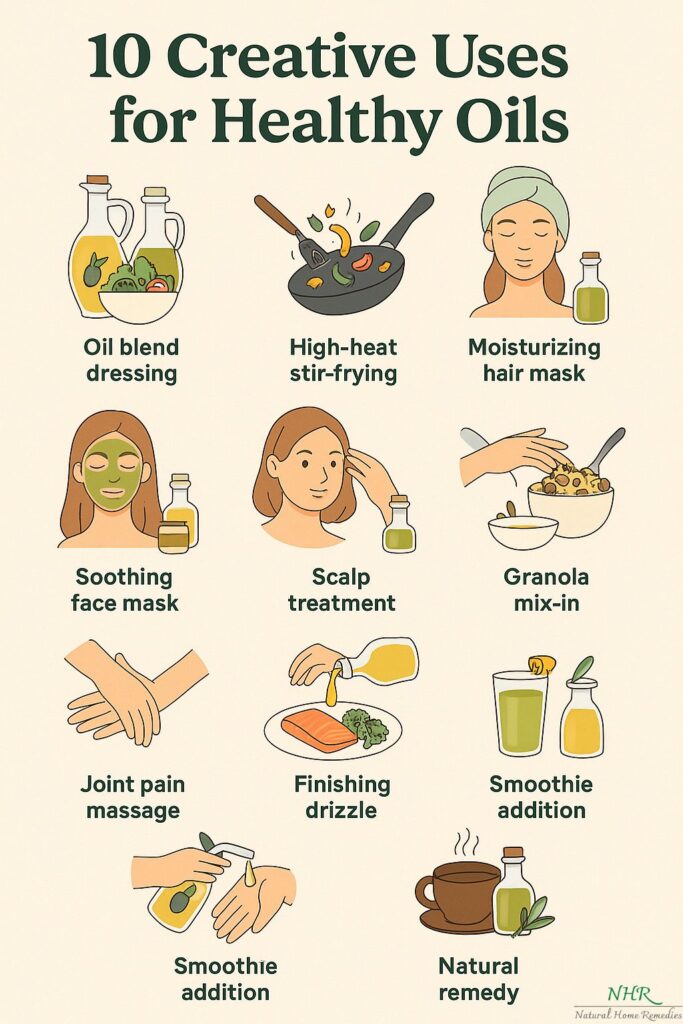Healthy oils are essential to a balanced lifestyle. Packed with heart-friendly fats, skin-loving antioxidants, and brain-supporting compounds, they offer benefits beyond the kitchen. From ancient remedies to cutting-edge nutrition, healthy oils have earned their place in modern wellness.
In this definitive guide, we break down the best healthy oils for your body, brain, and beauty routine—including olive, coconut, avocado, flaxseed, walnut, sesame, pumpkin seed, black seed, hemp seed, and a detailed safflower vs. sunflower oil comparison.
Whether you’re following a Mediterranean diet, cooking at high heat, or looking for a natural skin serum, the right oil can make all the difference.
Why Healthy Oils Matter
Healthy oils provide essential fatty acids, antioxidants, and fat-soluble vitamins that the body cannot produce on its own. They impact everything from cholesterol and inflammation to hair growth and hormone health.
Key Nutrients Found in Healthy Oils:
- Monounsaturated Fats (MUFAs): Found in olive and avocado oils. Support heart health and reduce LDL cholesterol (Nutrients, 2018).
- Polyunsaturated Fats (PUFAs): Omega-3 (like ALA in flaxseed) and omega-6 fatty acids help manage inflammation and support brain function (Circulation, 2014).
- Antioxidants: Polyphenols in olive oil and lignans in sesame oil fight oxidative stress.
- Special Compounds: Lauric acid (coconut), thymoquinone (black seed), and phytosterols (pumpkin seed) support immunity and hormone balance.
Science Says: A 2020 meta-analysis (Cochrane) found replacing saturated fats with MUFAs and PUFAs can reduce heart disease risk by 15–30%.
Best Healthy Oils and Their Science-Backed Benefits
1. Olive Oil: For Heart, Brain & Skin Health
- Nutrient Profile: 55–83% oleic acid, polyphenols, vitamin E.
- Benefits:
- Lowers cholesterol and inflammation (PREDIMED, 2018)
- Enhances brain function (Journal of Alzheimer’s Disease, 2021)
- Hydrates and soothes skin (Journal of Cosmetic Dermatology, 2018)
- Best Uses: Salad dressings, sautéing (smoke point ~375°F)
👉 Read More: Benefits of Olive Oil for Heart, Skin, Brain, and Thalassemia Major
2. Coconut Oil: Superfood or Hype?
- Nutrient Profile: 90% saturated fat, ~50% lauric acid, MCTs.
- Benefits:
- Boosts energy metabolism (American Journal of Clinical Nutrition, 2008)
- Moisturizes skin and hair (Journal of Cosmetic Dermatology, 2015)
- Caution: High saturated fat may increase LDL (Circulation, 2020)
- Best Uses: Baking, oil pulling, natural skincare
3. Avocado Oil: High-Heat Heart Helper
- Nutrient Profile: ~70% oleic acid, vitamin E, lutein.
- Benefits:
- Improves lipid profiles (Journal of Clinical Lipidology, 2015)
- Protects skin against UV damage (Nutrients, 2019)
- Best Uses: Stir-frying, roasting (smoke point ~520°F)
4. Flaxseed Oil: Plant-Based Omega-3 Powerhouse
- Nutrient Profile: 50–60% ALA omega-3s, lignans.
- Benefits:
- Balances estrogen levels (Journal of Nutrition, 2006)
- Reduces inflammation markers
- Best Uses: Smoothies, salad drizzles (avoid heating)
5. Walnut Oil: Brain & Memory Support
- Nutrient Profile: ALA omega-3s, polyphenols.
- Benefits:
- Enhances memory (Neurobiology of Aging, 2011)
- Best Uses: Dressings, finishing oil
6. Sesame Oil: Antioxidant & Skin Soother
- Nutrient Profile: Lignans (sesamin, sesamol), vitamin E.
- Benefits:
- Reduces oxidative stress
- Fights aging and skin irritation (Journal of Cosmetic Dermatology, 2017)
- Best Uses: Stir-fries, massages, scalp treatments
7. Pumpkin Seed Oil: Hair & Prostate Wellness
- Nutrient Profile: Zinc, phytosterols, DHT blockers.
- Benefits:
- May reduce hair loss (Journal of Dermatology, 2014)
- Supports prostate and urinary health
- Best Uses: Salad dressings, supplements
8. Black Seed Oil: Immunity & Inflammation Relief
- Nutrient Profile: Thymoquinone, omega-6/9.
- Benefits:
- Boosts immune response (Journal of Functional Foods, 2016)
- Reduces inflammation
- Best Uses: Teas, topical applications, supplements
9. Hemp Seed Oil: Skin, Joint & Hormone Balance
- Nutrient Profile: 3:1 omega-6 to omega-3 ratio, GLA.
- Benefits:
- Hydrates dry skin (Molecules, 2019)
- May ease joint pain and inflammation
- Best Uses: Dressings, body oil, capsules
10. Safflower vs. Sunflower Oil: Which is Better?
[Comparison Table: Fat Content, Smoke Point, Key Benefits]
| Oil Type | Fatty Acids | Smoke Point | Best For | Notable Benefits |
|---|---|---|---|---|
| Safflower (High Oleic) | 70–75% MUFA | ~510°F | High-heat cooking | Lowers cholesterol (JNB, 2013) |
| Sunflower (High PUFA) | Omega-6, Vitamin E | ~440°F | Medium heat | Skin repair, antioxidant support |
Oils and Thalassemia Major: What You Should Know
For individuals with Thalassemia Major, managing oxidative stress is crucial due to the increased risk of iron overload and associated complications. Incorporating certain healthy oils into the diet may offer supportive benefits, though they are not a substitute for medical treatment.
Beneficial Oils for Thalassemia:
-
Olive Oil: Rich in polyphenols and vitamin E, olive oil possesses antioxidant properties that can help combat oxidative stress, a significant concern in thalassemia patients.
-
Black Seed Oil: Contains thymoquinone, known for its anti-inflammatory and immune-modulating effects, which may be beneficial in managing chronic conditions.
-
Flaxseed Oil: A plant-based source of omega-3 fatty acids (ALA), flaxseed oil supports cardiovascular health, which is particularly important for individuals with anemia-related cardiac strain.
-
Pumpkin Seed Oil: Provides zinc and phytosterols, nutrients that support immune function and overall well-being.
Usage Tips:
-
Opt for cold-pressed, organic oils to maximize nutrient retention.
-
Use oils in moderation, incorporating them into dressings or drizzling over foods to preserve their beneficial properties.
-
Avoid heating delicate oils like flaxseed or black seed oil, as high temperatures can degrade their nutritional value.
Note: Always consult with a healthcare professional before making dietary changes, especially when managing conditions like Thalassemia Major.
Choosing the Right Oil for You
Consider These Factors:
- Health Goals: Heart, skin, hormone balance?
- Cooking Style: High-heat vs. cold dishes?
- Certifications: Look for USDA Organic, COOC, and Non-GMO.
- Extraction: Opt for cold-pressed, unrefined varieties.
- Packaging: Choose dark glass bottles to prevent rancidity.
Top Recommended Brands (affiliate links):
- California Olive Ranch Extra Virgin – Olive Oil
- Chosen Foods – Avocado Oil
- Nutiva Organic – Coconut Oil
- Barlean’s Organic – Flaxseed Oil
Sustainability Tip: Support brands practicing regenerative agriculture and eco-friendly packaging.
How to Use Healthy Oils in Everyday Life
Culinary Recipes
- Mixed Oil Dressing: Olive + avocado + flaxseed + lemon juice.
- High-Heat Stir-Fry: Avocado or safflower oil at 400°F.
- Coconut Granola: Oats + nuts + honey + coconut oil.
Natural Remedies
- Olive Oil Face Mask: Olive oil + honey.
- Pumpkin Seed Scalp Oil: Massage 1 tbsp into scalp.
- Hemp Seed Oil Massage: Use for joint relief.

Myths, Risks & Daily Use
Common Myths
- MYTH: All oils are bad fats.
FACT: MUFAs & PUFAs support cardiovascular health. - MYTH: Coconut oil is a miracle cure.
FACT: It has targeted benefits, but moderation is key.
Potential Risks
- Overuse: 1 tbsp = ~120 calories. Can lead to weight gain.
- Overheating: Using oils past their smoke point creates toxins.
How Much Oil is Safe Daily?
- General Recommendation: 1–4 tablespoons/day (20–35% of calories, WHO guidelines, European Journal of Clinical Nutrition, 2017)
- By Oil Type:
- Olive: 1–2 tbsp for the heart
- Coconut: ≤1 tbsp
- Avocado: 1–2 tbsp for cooking
Note: People with chronic conditions like thalassemia should consult a doctor.
Storing Oils the Right Way
- Store in Cool, Dark Places: 60–70°F
- Use Dark Glass Bottles: Reduces light exposure
- Refrigerate Delicate Oils: Like flaxseed or walnut, for freshness
Affiliate Pick: TrendPlain 2 in 1 Glass Olive Oil Dispenser, Measuring Spoons Set with Leveler
Final Thoughts
Healthy oils are more than a cooking ingredient—they’re a daily wellness ally. Use this guide to choose the oil that matches your health goals and lifestyle, and explore our in-depth articles starting with: Benefits of Olive Oil for Heart, Skin, Brain, and Thalassemia Major.
Frequently Asked Questions (FAQs)
Q: What are the best oils for cooking?
A: Avocado oil (520°F) for high heat, olive oil (375°F) for medium heat, and coconut oil for baking.
Q: Is coconut oil a superfood?
A: It offers energy from MCTs but requires moderation due to saturated fat (Circulation, 2020).
Q: Which oil is richest in omega-3s?
A: Flaxseed oil (50–60% ALA) is a top plant-based source.
Q: Can oils improve skin health?
A: Yes, olive, sesame, and hemp seed oils hydrate and soothe skin.
Q: How much oil should I use daily?
A: 1–2 tablespoons, adjusted for caloric needs.
Q: Are high smoke point oils healthier?
A: Oils like avocado and safflower are stable at high heat, preserving nutrients.
Q: How do I store delicate oils like flaxseed?
A: Refrigerate in dark bottles to prevent rancidity.
Bonus Tip: Experiment with oil blends—mix olive and walnut oil for a brain-boosting dressing.
Disclosure: This article contains affiliate links. We earn a commission on qualifying purchases at no extra cost to you.



